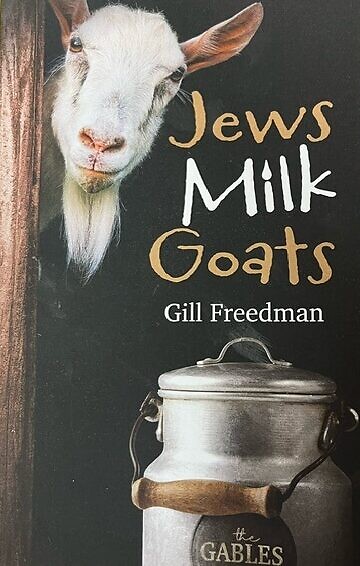Ten years ago my husband Jeremy (a divorce lawyer) and I moved to the countryside and took on a house and five acres of land with a 350-year old barn and stables. We renovated the place, tamed the garden and acquired livestock. This is not a totally unusual experience except that we are well into middle age and combine smallholding with an observant Jewish life. We hold services for Rosh Hashanah, Yom Kippur, Shavuot and Chanukah, Masorti rabbis hold an annual retreat here, the JLE have used the facilities for weekends and various Jewish youth groups have come to spend Shabbat surrounded by fields, animals, peace and quiet, just 50 miles from London.
We are fully integrated in the village and have made many close friends whilst being totally open about our Judaism. We have opened our home to anyone who wishes to visit. Recently we took in an Israeli family from Tel Aviv who were looking for some respite during the war. We were very involved in communal Jewish life in London for 30 years as members of Muswell Hill Synagogue and then Hampstead Garden Suburb Synagogue. My book, Jews Milk Goats, tells the story of our experiences. Here is an excerpt.
Get The Jewish News Daily Edition by email and never miss our top stories
Free Sign Up
BOTTLE FEEDING AND PURIM
I threw my wig onto the back seat and put my foot down to cover the 50 miles home. I was anxious to get there before midnight and on a quiet road the journey would take less than an hour. Next to me Jeremy had closed his eyes and was in a deep, whisky sleep so I turned on the radio for company. As we approached the gate I prodded my passenger. “Come on, wake up. I need you to go inside and put the kettle on and I’ll run upstairs and take these clothes off. The bottles are in the fridge.”
I changed out of my party frock and into milk-spattered trousers and a hoodie. Jeremy was wide awake now and in the kitchen, warming the bottles by standing them in large cups of hot water. As I opened the back door he grabbed the torch and lit up a path as we strode into a field full of ewes and lambs to feed PJ and Ponyo.
The twins’ mother growled at us and stamped her foot. Poor old Mother Domino didn’t understand that her scarred udder couldn’t produce enough milk for her two-week-old boy and girl. It had been this way for the past three years since Domino developed mastitis and each season we had to help raise her lambs, much to her disgust.
It was Purim night and we had dressed up for the reading of the Megillah – The Book of Esther – in the synagogue in Borehamwood. The story of the beautiful virgin Esther, the Persian King Ahasuerus – Xerxes – and his antisemitic adviser Haman is an excuse for Jews around the world to celebrate their deliverance from genocide back in the year 650 BCE. To mark our survival we put on fancy dress, send each other gifts of chocolates, sweets, wine and cakes, give money to charity and drink until we can’t tell the difference between the names of the hero and the villain of the story. What’s not to like? We listen to the story on the night of the festival of Purim and then a second time the following morning. The theme of the narrative runs throughout our history, ‘They tried to kill us, they failed, let’s eat!’
Under the light of a watery moon and the beam from the torch, two hungry lambs bleated as they ran towards us, opened their mouths and glugged at their bottles of milk. In less than two minutes they were finished and had disappeared to find their mother and their friends. We had time for less than five hours’ sleep before the alarm woke us and at 5.30 am Jeremy drove the 50 miles back to Borehamwood to attend synagogue for the early morning reading of the Megillah.
I had arranged to join him three hours later for a recital at the house of the rabbi for those of the community who wanted a more leisurely start to the day. That worked well for us. I would feed the lambs, open up the chicken houses and let the goats out into the paddock.
The best-laid plans at The Gables don’t always work out. It was 7.30 am and I was giving PJ and Ponyo their breakfast bottles when I heard a groaning noise coming from the other side of the barn. When the bottles were empty I went to investigate. Sitting on the straw, looking up to the roof and frothing at the mouth was Surprise, an 18-month-old ewe who had never lambed before. Poking out of her backside was a head and it was stuck. Surprise was in pain and I was in a panic.
I threw off my coat, rolled up the sleeves of my jumper and quite literally took matters into my own hands, grabbing Surprise’s horns and shouting at her, “Stand up girl. We have to work on this together.” As I wrapped my palms around the lamb’s head and began to pull, the head and front legs started to emerge. “Push, Surprise, we need one big push.” I don’t know if Surprise understood me but a few seconds later the lamb slithered out covered in blood and mucus, floppy and lifeless. Poor little creature. She lay still on the straw as I cleared the veil of mucus from her nose and mouth. She gave a flutter. Alive? I rubbed her sides and belly and she twitched again. Lifting her gently, I placed the lamb in front of her mother’s nose. Surprise sniffed and put her muzzle near to the lamb which amazingly let out a tiny bleat.
 As I dipped my bloody hands into a bucket of water, I suddenly felt cold and began to shake. I grabbed my coat, put it on and zipped it up to my chin and then I stood watching Surprise begin to lick the lamb clean. “Good girl, Surprise, you have your first lamb and it’s a girl.” I stroked her side and gave her a kiss on the top of her head. Surprise made mothering noises. Sheep really do speak if you listen. There are different sounds for different situations. A ewe and her lamb will call to each other across a field of noisy sheep, picking out their unique cries and finding one another, even in the dark. I didn’t want to leave the barn, I just wanted to watch and savour the moment, but I had to finish the morning chores, opening up the goat house, feeding chickens, ducks and geese and filling feeders and water containers. Just fifteen minutes later when I returned to check on Surprise the lamb was trying to stand and calling out loudly. She was beautiful and perfect. I reluctantly left mother and baby, went into the house, washed and changed into clean clothes and took a last peek in the barn before I drove back to London. Little Esther was on her feet and searching for her mother’s teat. What a Purim miracle.
As I dipped my bloody hands into a bucket of water, I suddenly felt cold and began to shake. I grabbed my coat, put it on and zipped it up to my chin and then I stood watching Surprise begin to lick the lamb clean. “Good girl, Surprise, you have your first lamb and it’s a girl.” I stroked her side and gave her a kiss on the top of her head. Surprise made mothering noises. Sheep really do speak if you listen. There are different sounds for different situations. A ewe and her lamb will call to each other across a field of noisy sheep, picking out their unique cries and finding one another, even in the dark. I didn’t want to leave the barn, I just wanted to watch and savour the moment, but I had to finish the morning chores, opening up the goat house, feeding chickens, ducks and geese and filling feeders and water containers. Just fifteen minutes later when I returned to check on Surprise the lamb was trying to stand and calling out loudly. She was beautiful and perfect. I reluctantly left mother and baby, went into the house, washed and changed into clean clothes and took a last peek in the barn before I drove back to London. Little Esther was on her feet and searching for her mother’s teat. What a Purim miracle.
One hour later as I sat in the rabbi’s house in London listening to the story of the deliverance of the Jews from wicked Haman’s plans, I couldn’t help smiling. I wondered how many of the nearly 300,000 thousand British Jews were leading such a schizophrenic existence. I didn’t know of any other Jews who were living on farms or smallholdings. Certainly not religiously observant Jews. “They should try it,” is what I thought. ‘It’s a great life. It can be done.”
Jews Milk Goats is published by The Gables Press, £3.99
https://www.jewishnews.co.uk/we-left-north-london-to-run-a-farm-but-we-still-live-an-observant-jewish-life/



